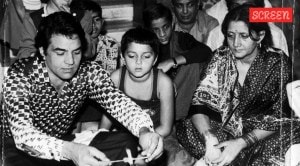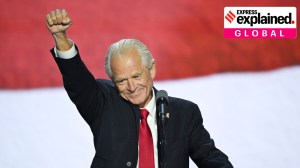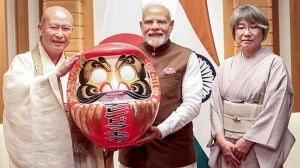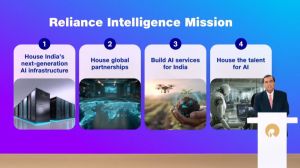Click here to follow Screen Digital on YouTube and stay updated with the latest from the world of cinema.
‘There are no heroes or villains in the film’: Arun Gopalan on John Abraham actioner Tehran and the politics of the movie
In an exclusive chat with SCREEN, Arun Gopalan, director of Tehran, breaks down the narrative choices and the politics of the film.
 Director Arun Gopalan breaks down the politics of his new film Tehran, starring John Abraham.
Director Arun Gopalan breaks down the politics of his new film Tehran, starring John Abraham.In Bollywood, it’s rare to find filmmakers who dare to wade into the murky waters of geopolitics while crafting an espionage thriller. More often than not, the genre falls back on the overfamiliar India-Pakistan conflict: a trope so repeatedly mined that it’s lost much of its dramatic charge. At best, some storytellers veer slightly eastward towards China or drift south to brush against Sri Lanka. In this tired landscape, Tehran, the new John Abraham-led actioner now streaming on Netflix, arrives like a gust of fresh wind. What sets it apart is its choice of battleground: the fraught and fiery Iran-Israel conflict — a subject that remains one of the most volatile in global politics. And it does so at a time when the world continues to look away from the ongoing genocide in Palestine; its silence deafening. In choosing to center its narrative here, Tehran dares to acknowledge what so many choose to ignore.
When I asked director Arun Gopalan why he chose Tehran as his debut in feature filmmaking, he paused before tracing the path that led him there. “There was another story I was chasing,” he said. “It had something to do with Phoolan Devi’s life. I found it fascinating. I bought the rights, even shot a trailer. Everything was in motion. But eventually, it didn’t happen.” The experience left a mark. “It shook my confidence a bit,” Gopalan admitted. So he says when Tehran came his way, it felt different, and more significant.
“When I first heard the story, it amazed me. The scale of it, Tehran, Israel, India, immediately you think of the challenge. How do you shoot in these places? How do you make it real? That challenge alone was tempting.” But beyond the logistics, it was the emotional core of the story that struck him. “As the story was narrated to me, I could see myself in the middle of it, in the heart of diplomacy on one side, and the human cost of statecraft on the other. And that question stayed with me: what is the emotional cost of statecraft? These decisions are made at the highest levels, what do they take from those involved?” For Gopalan, then, the film became less about spectacle and more about consequence. “You realise you’re part of a geopolitical chessboard. Every move is calculated, every reaction deliberate. And in that, there are people, carrying out orders, living in the fallout. That’s what I wanted to explore.”
 Arun Gopalan says there are no easy heroes or villains in his film Tehran.
Arun Gopalan says there are no easy heroes or villains in his film Tehran.
What sets Tehran apart from the long line of espionage thrillers we’ve grown used to is not just its geopolitical ambition, but also its stripped-down treatment. There’s a certain dryness to the way the story unfolds: clinical, methodical, almost procedural. Yet that very form becomes the film’s strength. It doesn’t flinch from the human cost of conflict. It doesn’t look away from the toll that statecraft takes on people who often have no real stake in the decisions being made. One moment early in the film captures this feeling. It passes almost unnoticed; a glimpse into the everyday routine of a spy. The drudgery of working out of dimly lit government offices, surrounded by piles of files, while colleagues quote poetry to fill the silence and keep themselves entertained. It’s this grounded realism that director Arun Gopalan says he was always trying to reach for.
“I thought I knew what this profession involved. You grow up watching these films, with all the spy agents, the diplomatic intrigue, the chase sequences, and somewhere, that’s what you imagine you’re making too,” he said. But it changed during research. “When I started meeting people from the Special Cell, I had to unlearn all of it. I had to wash those images out of my mind. Because real intelligence works, it’s not what we’ve seen. These people are like any other government employee. It’s not some high-stakes drama every day. They’re stamping envelopes or files. They’re having casual conversations. It just happens that their job, and what’s at stake, is very different.”
One of the more intriguing aspects of Tehran lies in how it interrogates the idea of “collateral damage” — a phrase often used to justify the human cost of covert operations. And yet, it’s precisely here that the film treads into delicate territory. While Tehran is bold in scope, its stance on Palestine feels, at times, frustratingly vague. Some viewers may even find its portrayal troubling, particularly because its central antagonist, Afshar Hosseini, (Hadi Khanjanpour) is a staunch supporter of a free Palestine. In a geopolitical climate where narratives are already skewed, this choice risks misinterpretation. When asked about this, director Gopalan is quick to push back against the idea of a binary framework.
“There are no heroes and villains in this film. That’s the whole point. No one is clean,” he said. He’s firm in his belief that the characters, including Hosseini and the protagonist Rajeev Kumar (Abraham) — exist in shades of grey. “Afshar Hosseini is a soldier. He’s fighting for a cause he believes in. His methods might be wrong, but so are Rajeev’s. I mean in the very first scene, he walks into a dhaba and shoots a man in cold blood. So, there are many layers to him.” The narrative, he explains, reflects a cycle of violence where no side remains untouched. “Israel retaliates because Iran killed their diplomats. Iran did that because Israel assassinated their scientists. So who’s right? No one, really.” He points to a line from the film that sums up its moral centre: “No one is clean here. I’m not here to judge.” Rajeev, he says, embodies this tension. “He’s carrying the burden of protocol, of state orders, but he also has a conscience. He knows there’s a difference between doing what’s expected and doing what’s right. And when the two no longer align, he chooses to follow what’s right. That, to me, is the heart of the film.”
And when asked why Tehran doesn’t delve more directly into the complexities of the Palestine issue, Gopalan offered a candid explanation, one rooted in the timing of the film’s development. “See, when I was writing this in 2021, things hadn’t escalated the way they have now,” he said. “The videos, the news stories, the genocide that’s unfolding in plain sight today, that wasn’t the scale back then. What I was responding to was, maybe, a milder version of what we’re seeing now. All I knew was I had to touch upon it in some way. There are so many characters in this film, and each one needed to carry something, either a trait or a cause. I had to give space for that to land, even in small ways. The least I could do was show the truth as I understood it, and try to offer a wide-angle view of all the players involved.”
But he is also clear that Tehran was never meant to be a film about Palestine. “It was never going to centre that issue. The idea was to graze it, to acknowledge it, not to claim it as the film’s core.” And yet, Gopalan doesn’t shy away from the implication that, were he to write it today, things would be different. “If I were to write and make this film now, it would be a very different approach. You can’t make a film like this in today’s world and not acknowledge what’s been happening for so long, and the silence around it.”


Photos
- 01
- 02
- 03
- 04
- 05































